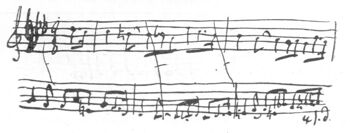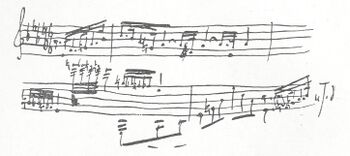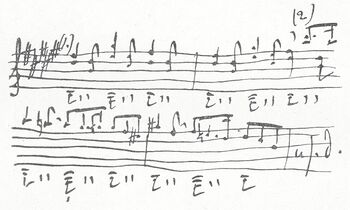Letter 763
| Date | 17 February/1 March 1878 |
|---|---|
| Addressed to | Nadezhda von Meck |
| Where written | Florence |
| Language | Russian |
| Autograph Location | Klin (Russia): Tchaikovsky State Memorial Musical Museum-Reserve (a3, No. 3129) |
| Publication | Жизнь Петра Ильича Чайковского, том 2 (1901), p. 117–120 (abridged) П. И. Чайковский. Переписка с Н. Ф. фон-Мекк, том 1 (1934), p. 216–220 П. И. Чайковский. Полное собрание сочинений, том VII (1962), p. 124–128 To my best friend. Correspondence between Tchaikovsky and Nadezhda von Meck (1876-1878) (1993), p. 183–188 (English translation) |
Text and Translation
| Russian text (original) |
English translation By Brett Langston |
Сколько радости доставили Вы мне сегодня письмом Вашим, бесценная моя Надежда Филаретовна! Как я неизмеримо счастлив, что симфония понравилась Вам, что, слушая её, Вы испытали те ощущения, которыми я был полон, когда писал её, что моя музыка запала Вам в сердце. Вы спрашиваете меня, есть ли определенная программа этой симфонии? Обыкновенно, когда по поводу симфонической вещи мне предлагают этот вопрос, я отвечаю: никакой! И в самом деле, трудно отвечать на этот вопрос. Как пересказать те неопределённые ощущения, через которые переходишь, когда пишется инструментальное сочинение без определенного сюжета? Это чисто лирический процесс. Это музыкальная исповедь души, на которой многое накипело и которая по существенному свойству своему изливается посредством звуков, подобно тому как лирический поэт высказывается стихами. Разница только та, что музыка имеет несравненно более могущественные средства и более тонкий язык для выражения тысячи различных моментов душевного настроения. Обыкновенно вдруг, самым неожиданным образом, является зерно будущего произведения. Если почва благодарная, т. е. если есть расположение к работе, зерно это с непостижимою силою и быстротою пускает корни, показывается из земли, пускает стебелёк, листья, сучья и, наконец, цветы. Я не могу иначе определить творческий процесс как посредством этого уподобления. Вся трудность состоит в том, чтоб явилось зерно и чтоб оно попало в благоприятные условия. Все остальное делается само собою. Напрасно я бы старался выразить Вам словами все неизмеримой блаженство того чувства, которое охватывает меня, когда явилась главная мысль и когда она начинает разрастаться в определенные формы. Забываешь все, делаешься точно сумасшедший, все внутри трепещет и бьётся, едва успеваешь намечать эскизы, одна мысль погоняет другую... Иногда посреди этого волшебного процесса вдруг какой-нибудь толчок извне разбудит от этого состояния сомнамбулизма. Кто-нибудь позвонит, войдёт слуга, прозвонят часы и напомнят, что нужно идти по делу... Тяжелы, невыразимо тяжелы эти перерывы. Иногда на несколько времени вдохновение отлетает. Приходится искать его, и подчас тщетно. Весьма часто совершенно холодный, рассудочный, технический процесс работы должен прийти на помощь. Может быть, вследствие этого и у самых великих мастеров можно проследить моменты, где недостаёт органического слепления, где замечается шов, части целого, искусственно склеенные. Но иначе невозможно. Если б то состояние души артиста, которое называется вдохновением и которое я сейчас пытался описать Вам, продолжалось бы беспрерывно, — нельзя было бы и одного дня прожить. Струны лопнули бы, и инструмент разбился бы вдребезги! Необходимо только одно: чтоб главная мысль и общие контуры всех отдельных частей явились бы не посредством искания, а сами собой, вследствие той сверхъестественной, непостижимой и никем не разъяснённой силы, которая называется вдохновением. Но я отвлёкся в сторону и не отвечаю на Ваш вопрос. В нашей симфонии программа есть, т. е. есть возможность словами изъяснить то, что она пытается выразить, и Вам, только Вам одним, я могу и хочу указать на значение как целого, так и отдельных частей его. Разумеется, я могу это сделать только в общих чертах. Интродукция есть зерно всей симфонии, безусловно главная мысль: Это фатум, это та роковая сила, которая мешает порыву к счастью дойти до цели, которая ревниво стережет, чтобы благополучие и покой не были полны и безоблачные которая, как Дамоклов меч, висит над головой и неуклонно, постоянно отравляет душу. Она , и её никогда но осилишь. Остаётся смириться и бесплодно тосковать: Безотрадное и безнадёжное чувство делается все сильнее и более жгуче. Не лучше ли отвернуться от действительности и погрузиться в грёзы. О радость! по крайней мере, сладкая и нежная грёза явилась. Какой-то благодатный, светлый человеческий образ пронёсся и манит куда-то. Как хорошо! Как далеко уж теперь звучит неотвязная первая тема аллегро! Но грёзы мало-помалу охватили душу вполне. Все мрачное, безотрадное позабыто. Вот оно, вот оно, счастье! Нет! это были грёзы, и фатум пробуждает от них: Итак, вся жизнь есть непрерывное чередование тяжёлой действительности со скоропреходящими сновидениями и грёзами о счастье... Пристани нет. Плыви по этому морю, пока оно не охватит и не погрузит тебя в глубину свою. Вот, приблизительно, программа первой части. Вторая часть симфонии выражает другой фазис тоски. Это то меланхолическое чувство, которое является вечерком, когда сидишь один, от работы устал, взял книгу, но она выпала из рук. Явились целым роем воспоминания. И грустно, что так много уж было да прошло, и приятно вспоминать молодость. И жаль прошлого, и нет охоты начинать жить сызнова. Жизнь утомила. Приятно отдохнуть и оглядеться. Вспомнилось многое! Были минуты радостные, когда молодая кровь кипела и жизнь удовлетворяла. Были и тяжёлые моменты, незаменимые утраты. Все это уж где-то далеко. И грустно и как-то сладко погружаться в прошлое... Третья часть не выражает определенного ощущения. Это капризные арабески, неуловимые образы, которые проносятся в воображении, когда выпьешь немножко вина и испытываешь первый фазис опьянения. На душе не весело, но и не грустно. Ни о чем не думаешь; даёшь волю воображению, и оно почему-то пустилось рисовать странные рисунки... Среди них вдруг вспомнилась картинка подкутивших мужичков и уличная песенка... Потом где-то вдали прошла военная процессия. Это те совершенно несвязные образы, которые проносятся в голове, когда засыпаешь. Они не имеют ничего общего с действительностью: они странны, дики и несвязны... Четвертая часть. Если ты в самом себе не находишь мотивов для радостей, смотри на других людей. Ступай в народ. Смотри, как он умеет веселиться, отдаваясь безраздельно радостным чувствам. Картина праздничного народного веселья. Едва ты успел забыть себя и увлечься зрелищем чужих радостей, как неугомонный фатум опять является и напоминает о себе. Но другим до тебя нет дела. Они даже не обернулись, не взглянули на тебя и не заметили, что ты одинок и грустен. О, как им весело! Как они счастливы, что в них все чувства непосредственны и просты. Пеняй на себя и не говори, что все на свете грустно. Есть простые, но сильные радости. Веселись чужим весельем. Жить всё-таки можно. Вот, дорогой мой друг, все, что я могу Вам разъяснить в симфонии. Разумеется, это неясно, неполно. Но свойство инструментальной музыки именно и есть то, что она не поддаётся подробному анализу. Где кончаются слов а, там начинается музыка, как заметил Гейне. Уж поздно. Не пишу Вам на этот раз ничего о Флоренции, кроме того, что я сохраню о ней на всю жизнь очень, очень приятное воспоминание. В конце будущей недели, следовательно, около 24-го числа (по нашему стилю), думаю уехать в Швейцарию, где намерен тихо прожить весь март и понемножку писать сочинения в разнообразных мелких формах. Итак, по получении Вами этого письма мой адрес снова будет: Clarens, Canton de Vaud, Villa Richelieu. Благодарю Вас, дорогая моя, за сегодняшнее письмо. От московских приятелей до сих пор ни слова. Напишу Вам об их мнении и подробно. Ваш П. Чайковский P. S. Сейчас, собираясь вложить письмо в конверт, перечёл его и ужаснулся той неясности и недостаточности программы, которую Вам посылаю. В первый раз в жизни мне пришлось перекладывать в слова и фразы музыкальные мысли и музыкальные образы. Я не сумел сказать этого как следует. Я жестоко хандрил прошлой зимой, когда писалась эта симфония, и она служит верным отголоском того, что я тогда испытывал. Но это именно отголосок. Как его перевести на ясные и определенные последования слов? — не умею, не знаю. Многое я уже и позабыл. Остались общие воспоминания о страстности, жуткости испытанных ощущений. Очень, очень любопытно, что скажут мои московские друзья? До свиданья. Ваш П. Чайковский Вчера провёл вечер в народном театре и смеялся много. Комизм итальянцев груб, лишён тонкости и грации, — но увлекателен донельзя. |
How much joy your letter brought me today, my precious Nadezhda Filaretovna. How immeasurably happy I was that the symphony pleased you, that when hearing it you experienced the feelings with which I was suffused when I wrote it, and that the music sank into your heart. You asked me whether there is a definite programme to this symphony? Usually when this question is put to me about a symphonic work my answer is: none! Indeed, this is a difficult question to answer. How can one put into words the intangible sensations which one experiences when writing an instrumental work without a specific subject? This is a purely lyrical process. This is, fundamentally, an unburdening of the soul in music, with its essence distilled into sounds, in the same manner in which a lyrical poet expresses himself in verse. The only difference is that music has much more powerful means and a more subtle language with which to express thousands of different emotions and frames of mind. Usually the seed of a future work will manifest itself suddenly in unexpected ways. If the soil is fertile, i.e. if there is a disposition to work, the seed will take root with remarkable power and swiftness, allowing buds to emerge from the soil, followed by leaves, branches and, ultimately, flowers. I cannot define the creative process without resorting to metaphors. The difficulty lies in the fact that the seed requires favourable conditions in which to germinate. Everything else happens by itself. It would be futile for me to try to express to you in words the immeasurable bliss of all the feelings that seize me when a main idea appears, and when it begins to flourish into a particular form. I forget everything and become literally like a madman, everything within me shakes and pulses, with barely time to scribble out my sketches as one idea runs into another... Sometimes in the midst of this magical process, some external stimulus will jolt me out of this somnambulistic state. Somebody might call, a servant enter, or a clock will strike and remind me that I need to go out on business... Such breaks are inexpressibly burdensome. Sometimes inspiration will fly away for quite a while. It's necessary to search for it, and often in vain. It is frequently necessary to fall back on an altogether cold, rational and technical working method. Perhaps it is because of this that the greatest masters have moments with an absence of organic flair, where the seams within the whole appear artificially sewn together. But it is impossible for it to be otherwise. If the condition of the artist's soul called inspiration that I am attempting to describe to you were to be continued without interruption, it should be impossible to live for a single day. The strings would snap, and the instrument should be dashed into smithereens! Only one thing is necessary: that the principal idea and the general outlines of all the movements did not come about by striving, but rather that they present themselves as a result of that supernatural, incomprehensible and unfathomable force that is called inspiration. But I have digressed on an aside without answering your question. In our symphony there is a programme, i.e. it is possible to express in words what it is trying to say, and to you, and only to you, I am able and willing to explain the meaning both of the whole and of the separate movements. Of course, I can do this only in general terms. The introduction is the seed of the whole symphony, undoubtedly the main idea: This is Fate: this is that fateful force which prevents the impulse to happiness from attaining its goal, which jealously ensures that peace and happiness shall not be complete and unclouded, which hangs above the head like the sword of Damocles, unwaveringly, constantly poisoning the soul. It is an invincible force that can never be overcome — merely endured, hopelessly. The bleak and hopeless feelings grow stronger and intense. Is it not better to escape from reality and to immerse oneself in dreams: Oh joy! Out of nowhere a sweet and gentle daydream appears. Some blissful, radiant human image hurries by and beckons us away: How wonderful! How distant the obsessive first theme of the allegro now sounds! Gradually the soul is enveloped by daydreams. Everything gloomy and joyless is forgotten. Here it is, here it is — happiness! No! These were daydreams, and Fate wakes us from them: And thus all life is an unbroken alternation of harsh reality with fleeting dreams and visions of happiness... No haven exists... Drift upon that sea until it engulfs and submerges you in its depths. That, roughly, is the programme of the first movement. The second movement of the symphony expresses another aspect of sadness. This is that melancholy feeling which comes in the evening when, weary from one's toil, one sits alone with a book — but it falls from the hand. There come a whole host of memories. It is sad that so much is now in the past, albeit pleasant to recall one's youth. Both regretting the past, and yet not wishing to begin life over again. Life is wearisome. It is pleasant to rest and look around. Memories abound! Happy moments when the young blood boiled, and life was satisfying. There are also painful memories, irreconcilable losses. All this is now somewhere far distant. It is both sad, yet somehow sweet to be immersed in the past... The third movement expresses no specific feeling. This is whimsical arabesques, vague images which can sweep past the imagination after drinking a little wine and feeling the first phases of intoxication. The spirit is neither cheerful, nor sad. Thinking about nothing in particular, giving free rein to the imagination, which somehow begins to paint strange pictures... Amid these memories there suddenly comes a picture of drunken peasants and a street song... Then, somewhere in the distance, a military procession passes. These are completely incoherent images which sweep through the head as one falls asleep. They have nothing in common with reality; they are strange, wild, and incoherent... The fourth movement. If within yourself you find no reasons for joy, then look at others. Go out among the people. See how they can enjoy themselves, surrendering themselves wholeheartedly to joyful feelings. Picture the festive merriment of ordinary people. Hardly have you managed to forget yourself and to be carried away by the spectacle of the joys of others, than irrepressible fate appears again and reminds you of yourself. But others do not care about you, and they have not noticed that you are solitary and sad. O, how they are enjoying themselves! How happy they are that all their feelings are simple and straightforward. Reproach yourself, and do not say that everything in this world is sad. Joy is a simple but powerful force. Rejoice in the rejoicing of others. To live is still possible. That, my dear friend, is all I can explain to you about the symphony. Of course, this is vague and incomplete. But an intrinsic quality of instrumental music is that it does not yield to detailed analysis. Where words end, music begins, as Heine remarked. It's already late. I'm not writing anything to you about Florence at this time, except that its very, very pleasant memories will stay with me for my whole life. At the end of next week, that is, around the 24th (by our style), I am thinking of going to Switzerland, where I intend to live quietly for the whole of March, gradually writing compositions in a variety of small forms. And so, when you receive this letter, my address shall once again be: Clarens, Canton de Vaud, Villa Richelieu. Thank you, my dear, for today's letter. I still have had no word from my Moscow friends. I will write to you about my opinion of them in detail. P. Tchaikovsky P. S. Just as I was about to put the letter in an envelope, I re-read it and was horrified at the incoherence and inadequacy of the programme I sent to you. This is the first time in my life that I have attempted to translate musical thoughts and images into words, and I could not manage to do this adequately. I was severely depressed last winter when writing the symphony, and it serves as a faithful echo of what I was experiencing. But it is known as an echo. How can it be translated into a clear and coherent succession of words? I do not know how to do that. I have already forgotten so much. They remain general recollections of the passions and mysterious feelings that I experienced. I am very, very curious about what my Moscow friends will say. Farewell. Yours P. Tchaikovsky Yesterday I spent the evening at the National Theatre and laughed a great deal. Italian comedy is vulgar, devoid of subtlety and grace, but immensely enjoyable. |





